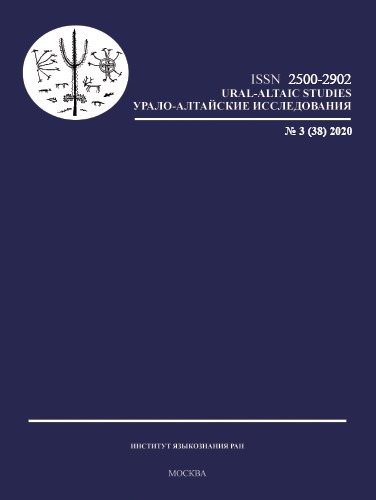Some new Late Proto-Yukaghir reconstructions with added thoughts and considerations on various etymologies
Some new Late Proto-Yukaghir reconstructions with added thoughts and considerations on various etymologies
Author(s): Peter Sauli PiispanenSubject(s): Phonetics / Phonology, Semantics, Comparative Linguistics, Finno-Ugrian studies, Philology
Published by: Институт языкознания Российской академии наук
Keywords: Yukaghir; reconstruction; etymology; semantic change;
Summary/Abstract: In this paper, historical documentation of the Yukaghir languages spoken in the far northeastern Siberia are employed for the reconstruction of a small number of additional or revised Late Proto-Yukaghir (PY) roots. Late Proto-Yukaghir is the latest common ancestor of all varieties of Yukaghir, including the still spoken Tundra Yukaghir and Kolyma Yukaghir languages. Previously, numerous Late Proto-Yukaghir roots have convincingly and exhaustively been reconstructed in Nikolaeva’s A Historical Dictionary of Yukaghir, published in 2006, and this meager report adds to those materials. The materials are presented and discussed in phonological and semantic terms, employing phonological methods similar to those of Nikolaeva’s research, and adding semantic considerations missing from the dictionary. The newly reconstructed or revised Late Proto-Yukaghir roots include: 1) Late Proto-Yukaghir *kejwə- ‘to be thin’, 2) Late Proto- Yukaghir *ačī- ~ *ači- ‘to carry’, 3) Late Proto-Yukaghir *puγö ‘warmth > some sort of warming clothing: fur, feathers, hair, beard’, 4) Late Proto-Yukaghir *inć- ‘today; now’, and 5) Late Proto-Yukaghir *nulińčə ‘crowd’. Furthermore, numerous etymological comments, notes, discussions and clarifying details are presented for Yukaghir lexicon, ranging from the obscure historical records to the modern languages, clarifying a few matters, correcting some and adding further information of interest to others. Yukaghir roots (or words of later Russian or Ewenki origin) are discussed, and given concrete meanings, include: PY *niγej- ‘heavy, difficult’, PY *l’omćə ~ *l’omjə ‘moisture; to shed feathers > to lose color’, PY *omnuγə ‘bitch’, PY *oń- ‘crack, slit, opening’, PY *per- ‘threshold, dug in poles of a yurt door’, PY *ńetl’ə ‘fox’, Rus. gavrik ‘collar muffler, scarf’, PY *šogi ‘bag’, PY *iwe:r ‘place around the hearth’, PY *eče: ‘father’, PY *mi:-bə ‘cutter’, PY *ejmə ‘price, payment’, Rus. piska ‘penis’, Rus. čaška ‘cup’, Rus. Varvara ‘Barbara’, Ewenki noγo:n ‘green’, and PY *nunkə ‘sheefish’.
Journal: Урало-алтайские исследования
- Issue Year: 2020
- Issue No: 03 (38)
- Page Range: 81-91
- Page Count: 11
- Language: English

